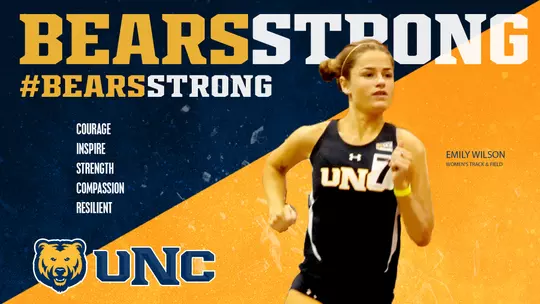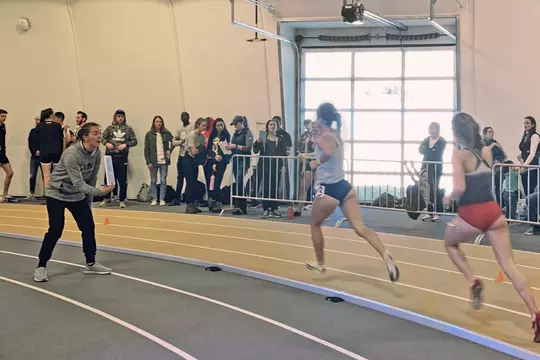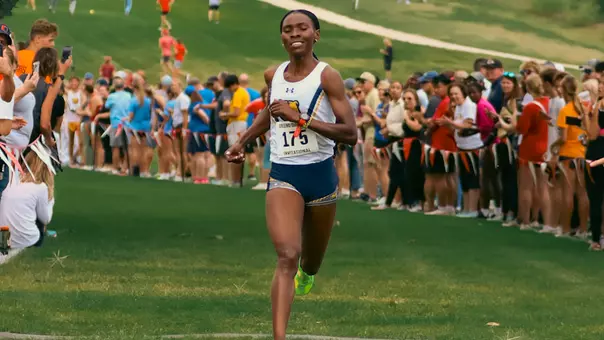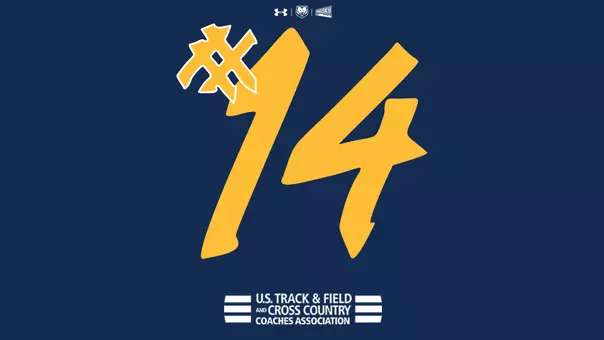
Running Her Own Path
By Ryan Pfeifer, UNCBears.com
12/18/2020
On your marks, get set, BOOM, the sound of the gun and the runners are off. That’s how most people know the beginning of a race goes, for Emily Wilson it’s completely different. Instead, it’s complete silence, that’s because she has been bilaterally deaf since she was three-years-old.
Born with hearing loss, Wilson and her three siblings all have something in their genetics that caused them to lose their hearing. Emily was the first of her siblings to completely lose her hearing.
Her parents tell the story of her sitting in the highchair one morning and she was not responding to them calling her name. They began to bang on pots and pans lightly at first but continuously increased in volume until she finally could feel the vibrations. That’s when they knew she was deaf.
“I was the first kid in my family to lose all of their hearing, my older sister didn’t lose hers until high school,” Wilson said. “They (My parents) didn’t have any familiar interaction with a deaf child.”
An athlete throughout her childhood, Wilson played a variety of sports, mainly focusing on soccer.
“I played soccer in high school until I had to choose between running and soccer. My dad coached me all my life and noticed I was really good at getting up and down the field and I never got tired while doing it. He was like maybe you should do track to help you stay in shape for soccer. At that time, I was playing on three soccer teams so running ended up becoming the thing I enjoyed while soccer became more of a job.”
The love for running is just one impact her dad Robert has made on his daughter’s life. He taught her how to be a fighter and seek opportunities for herself in a world that consistently told her no.
“His biggest thing was that there are no shortcuts in life. I am in a world that tells me 'no' a lot and I have to make my own opportunity. I was really glad my dad was my coach and incorporated that mentality in me. I think without it I would have given up on a lot of things and just take the short cut and let other people help me all the time.”

One of those opportunities came and she has literally run with it by coming to Northern Colorado to compete on the cross country and track & field teams.
The journey to UNC was not always easy for Wilson trying to navigate a world with cochlear implants to help her hear. She never felt fully accepted into the “regular world” or deaf culture because of those implants.
“With me having a cochlear implant I was seen as I do not want to be deaf. I was seen as dismissing deaf culture, so I never really got around it because I was so scared of being judged.”
High school helped her as she started to be embraced by others who are deaf as she met more people, but a new challenge awaited her in college. Being a student-athlete is hard enough balancing school, your sport and life itself. Add in being miles away from home and deaf and the pressure mounts up.
Wilson’s freshman season was quiet for her as she worked through injuries and adjusted to college life. Then another challenge came her way in a new coaching staff. Except for this time the challenge turned into a mentorship and friendship that will last a lifetime.
Assistant Cross Country and Track and Field Coach Stormie Sickler came to UNC from Northern State in Aberdeen, South Dakota. When getting to know her new student-athletes she learned that Emily was deaf.
“The first thing I did with Emily was learn how to communicate with her and how she wants to be communicated with,” Sickler said. “Obviously, I cannot yell out splits to her so learning little ques, always looking her in the eye, facial expression and really learning how to communicate with one another without verbal communication.”
“She didn’t know I could speak at first and started learning ASL right away,” Wilson added.
That buy-in right away from Coach Sickler caught Wilson’s attention. Since their initial get to know you the coach and student-athlete have grown a strong bond.
“She is the first coach to understand me. There are coaches that will help you, but there are coaches that will understand you. She understands me. Rather than assuming I need the help she allows me to come to her when I need the help,” Wilson said. She will find ways to make things easier for me without me noticing it. She does it because she knows I wouldn’t ask for it, but I probably do need to.”
The two had a breakthrough during the middle of indoor track and field season.
She is the first coach to understand me. There are coaches that will help you, but there are coaches that will understand you. She understands me. Rather than assuming I need the help she allows me to come to her when I need the help,” Wilson said. She will find ways to make things easier for me without me noticing it. She does it because she knows I wouldn’t ask for it, but I probably do need to.
“We had the biggest breakthrough with our communication. We were at South Carolina and I decided to bring a whiteboard. On a track, I needed to be yelling out splits and she needed to know each of her 200 splits in a mile in order for her to break 5:10,” said Sickler. “Most coaches are yelling out at each lap, but she can’t hear that since she races without her implant. South Carolina’s coach got me on the inside of the track and I would write down a number that was her split.”
“At meets, she now writes my splits on a whiteboard and that has made me run faster because I never knew the times people were calling out,” Wilson commented about the use of the whiteboard. “I was just guessing. She knows that when I am able to visually see the time I can get it but if she just yelled it out I would never know.”
That breakthrough led to breaking down a wall in her performance as she finished her mile under 5:10 for the first time.
“That was the moment I knew this is what we have to do. After that, I would make sure I brought a whiteboard with me and write down every single split and she knew exactly where she was,” Sickler added.

As the winter turned to spring the breakthrough in February had both excited for the outdoor season, but then the COVID-19 global pandemic hit. Cutting the season short was a disappointment, but for Wilson, she now had to face a world that always wore masks, a blow to any deaf person. Reading lips is a huge part of how Wilson can communicate with others.
“For the first quarter of the pandemic I struggled with my depression and anxiety and didn’t leave the house for a while because I didn’t want to deal with it,” she said.
Knowing the difficulty that Emily was probably going through, Sickler showed another side of what it means to be a coach, in mentorship. While getting an athlete to perform their best is part of the job for a coach, getting to know that athlete as a person and mentor them to grow in all aspects of life is what makes a great coach. That’s exactly what Stormie did.
“One of the biggest things was just reminding her that she’s not in it alone. I think that is her biggest fear of being left out and by herself. I just reminded her that I am here for you, the other coaches are here for you. We’ll make sure the team adapts to being around her. We have clear masks to wear around her which helps. It was about reinforcing to her that I am here for her, Coach Angel is here for her, we all are here for her.”
“The biggest thing she did was just checking in. It let me know that someone was there for me, to talk to and take care of me if I needed it. If she didn’t do that I probably would have wanted to quit and move back home to be closer to family, but because of her I stuck it out and it got better.”
Now knowing Coach Sickler, the rest of the UNC track & field and cross country staff, the team and all of UNC Athletics is with her, Wilson has the chance to show the world what she can do.





